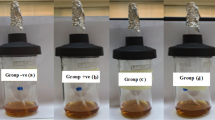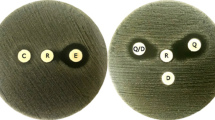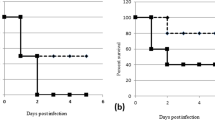Abstract
RECENT work by McVay, Laird and Sprunt1 has shown that aureomycin may be of value in the treatment of amœbiasis. Because of the small number of cases they reported on, and the comparatively short period of parasitological examination after treatment, it is impossible, as yet, to judge the true value of this antibiotic as an anti-amœbic drug.
This is a preview of subscription content, access via your institution
Access options
Subscribe to this journal
Receive 51 print issues and online access
$199.00 per year
only $3.90 per issue
Buy this article
- Purchase on Springer Link
- Instant access to full article PDF
Prices may be subject to local taxes which are calculated during checkout
Similar content being viewed by others
References
McVay, L. V., Laird, R. L., and Sprunt, D. H., Science, 109, 590 (1949).
Jones, W. R., Ann. Trop. Med. Parasit., 40, 130 (1946).
Hargreaves, W. H., Lancet, 249, 68 (1945).
Stewart, G. T., Jones, W. R., and Rogers, M. A. T., Nature, 161, 936 (1948).
Singh, B. N., Brit. J. Exp. Path., 26, 316 (1945).
Author information
Authors and Affiliations
Rights and permissions
About this article
Cite this article
JONES, W. Antibiotics in the Treatment of Amœbiasis. Nature 165, 649–650 (1950). https://doi.org/10.1038/165649b0
Issue Date:
DOI: https://doi.org/10.1038/165649b0
Comments
By submitting a comment you agree to abide by our Terms and Community Guidelines. If you find something abusive or that does not comply with our terms or guidelines please flag it as inappropriate.



